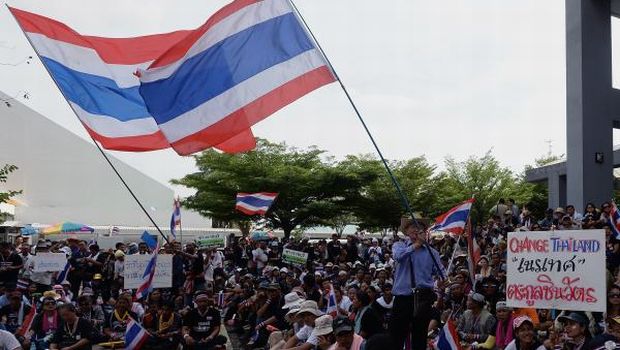
An anti-government protesters occupy the premises of the Telephone Organisation of Thailand (TOT) compound in Bangkok on November 30, 2013. (AFP PHOTO/Indranil MUKHERJEE)
Bangkok, Associated Press—Anti-government protesters in Thailand placed symbolic padlocks on the doors of several state-run offices Saturday, continuing a week-long campaign to paralyze the administration of Prime Minister Yingluck Shinawatra.
Authorities, meanwhile, continued their hands-off approach to the protesters in an effort to avoid violence.
The opposition-led protesters have declared that Sunday will be their “victory day,” and have urged followers to ratchet up a week-long campaign that included seizing the Finance Ministry, turning off power at police headquarters and camping at a sprawling government office complex.
“Tomorrow is the day we will declare victory,” said Akanat Promphan, spokesman for the opposition-led movement. “We might have to break the law, but we will accept the consequences and punishment. We will not run away.”
Amid growing concerns of violence, Saturday’s march started tamely.
Protesters marched to the Department of Special Investigation, the country’s equivalent of the FBI. They tried and failed to pick a lock at the front door, so placed their own padlock on it and left.
Their next targets were the nearby headquarters of two state telecommunications agencies, TOT and CAT Telecom, where they also placed padlocks on the doors to block workers from entering Monday morning.
As part of the government’s strategy to avoid confrontation, there was no police presence outside any of the offices, which had regular building security. Officials at TOT greeted the protesters with peace offerings, handing out drinking water and asking them not to enter the buildings.
The opposition-led movement accuses Yingluck of acting as a proxy for her billionaire brother, former Prime Minister Thaksin Shinawatra, who was deposed in a 2006 military coup and is living overseas to avoid his sentence for a corruption conviction.
Leaders of the protests say their goal is not just to force Yingluck out of office but to rid the country of Thaksin’s influence. He is a deeply polarizing figure, adored by much of Thailand’s rural poor and despised by the educated elite and middle class who accuse him of widespread corruption and other offenses.
The demonstrations have raised fears of new political turmoil and instability in Thailand.
A rally planned for later Saturday in Bangkok by Thaksin’s supporters has raised tensions further. Busloads of supporters from the countryside were coming in to join the event being held inside a stadium.
Leaders of the opposition protests said their main targets were reserved for Sunday, including the national police headquarters and the Interior, Foreign and Education Ministries, among others.
Another target was the Government House, the prime minister’s office compound, where security was increased on Saturday. Riot police were sent to guard the compound, and police installed concrete barriers and barbed wire, according to The Nation newspaper’s website, which said that government officials were packing important documents for fear they might not be able to enter Monday.
In 2008, anti-Thaksin demonstrators occupied those offices for three months to push demands that his allies step down from power.
Crowd sizes peaked last Sunday at over 100,000 and have dwindled in recent days to tens of thousands, but organizers have kept each day dramatic by targeting new and different seats of power.
